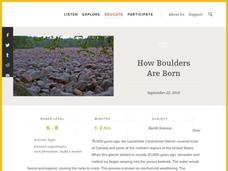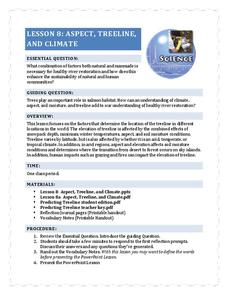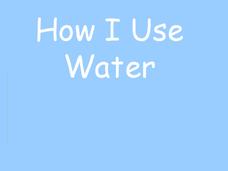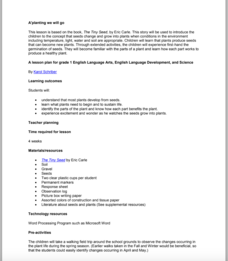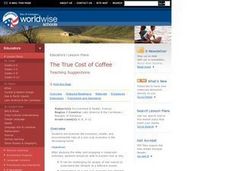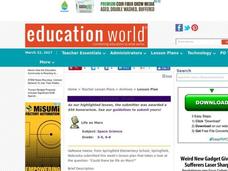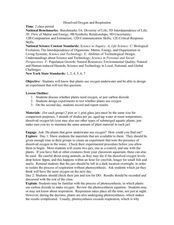Science Friday
How Boulders Are Born
Want your class to rock? Then try this boulder activity. Pupils learn about a specific boulder field and use edible materials to demonstrate the geological processes that formed this unique feature. Weathering, erosion, and mass wasting...
National Park Service
Aspect, Treeline, and Climate
Head to the treeline and beyond to examine how this feature of the landscape affects weather and climate, which gives scientists clues about its health. Class members' observations of photographs provide the data that drives the...
Curated OER
How I Use Water
Beginning with a brief anticipatory set on how water is commonly used, this presentation evolves into a well planned lesson on the water cycle. Students will discuss vocabulary, label the parts of the water cycle, locate where water is...
University of Wisconsin
Rain Garden Species Selection
The activity really comes to life within its intended unit on starting a rain garden. Working in groups, participants research native plants and coordinate them with the conditions in the designated garden area. Give the class access to...
Curated OER
All Mixed Up!
What happens when solids are added to liquids? After reading an informative paragraph about solutions, learners answer six true/false questions regarding solutions, and what substances will dissolve into liquids they are mixed with. A...
Curated OER
Midnight Dumpers
Students explain how pollution affects ground water. They participate in a simulation to discover the location of an illegal dump. Students explore the monetary benefits, risk and environmental concerns are factors in business decisions.
Curated OER
Praire Biome Models
Fifth graders, in groups, list the physical characteristics of a biome and think of ways in which animals might have to adapt to live there and make a biome mobile ball that show the different types of habitats that shape the praire biome.
Curated OER
Agents of Erosion
Fourth graders observe and identify the effects of geological activities and weathering on Earth's surface. They also take a look at reports of events such as storms, earthquakes, floods, and volcanoes. There is a hefty hands-on activity...
Curated OER
Biomes and Plant Growth
Seventh graders design four biomes models and plant three types of seeds in them to observe growth. In groups for each type of biome, they predict the seeds' growth in each of the settings. Students follow the conditions on a biome chart...
University of Wisconsin
Noting Notable Features for Rain Gardens
Eight groups in your class are each responsible for a different aspect of surveying the campus for a suitable rain garden location. Features to consider include water flow, topography, sun/shade patterns, land surface, vegetation,...
University of Wisconsin
Designing a Rain Garden
Now it's time for all of the data collected in previous lessons to be applied to the design of a rain garden. This resource can only be used as part of the greater whole, since learners will need to rely on gathered knowledge in order to...
Cornell University
Weed IPM
Go on a weed hunt! Scholars gain insight into the characteristics of plants and examine the outdoor environment in order to identify five different types of weeds. Learners then show what they know with a one-page reflection.
Curated OER
Renewable vs. Non-Renewable Resources
Fifth graders are introduced to the important topic of renewable, and non-renewable, resources. They are expected to be able to correctly categorize different types of resources as renewable or non-renewable. Another emphasis of this...
Curated OER
A'planting We will Go
Germination is an amazing process that results in amazing things. The book The Tiny Seed is the inspiration for a set of activities that will help build early literacy, observation, language, and writing skills. The class observes how...
Curated OER
Do Plants Need Water?
First graders utilize observational skills to articulate similarities and differences in the plants they observe. They make comparisions of size, color, and height. Lima beans are planted at successively farther distances from a water...
Curated OER
The Amazing Ant
Students explain that ants are an important element of nature's balance. Ants eat many insects and are food to other animals. They watch a video and conduct hands-on activities that give them an excellent overview of the ants role in...
Curated OER
Water Pollution
Here is a fine lesson for fifth graders that will give them an idea of the variety of impacts that human-introduced pollutants have on the environment. After an initial class discussion and teacher-led demonstration, pupils brainstorm...
Curated OER
The True Cost of Coffee
Young scholars examine the economic, health and environmental risks of being a one-crop country. They explain the risks of relying on one crop. They also identify the factors that resist change.
Curated OER
Life on Mars
Students research the feasibility of life on Mars and debate what it would need in order to sustain life. They work in teams to predict, research, infer, and explain their theory using models they build.
Curated OER
Layers of the Rainforest
What a great way to discuss the rainforest! Learners discuss the importance of adaptation in the environment and how it is linked to survival. They use critical thinking and inference skills to place animals and insects in the different...
Curated OER
Dissolved Oxygen and Respiration
Young scholars are presented with the question, "Do plants that grow underwater use oxygen?" They create an experiment to test the presence of dissolved oxygen in the water using provided materials. Student experiments include a control...
Curated OER
Tides in the Hudson
Students view an illustration of the Hudson River watershed and identify the bodies of water shown. They discuss what happens when fresh and salt water mix. Students view a teacher demonstration of the stratification of fresh and salt...
Curated OER
Change Since 1609
Learners recognize how the climate of the Hudson Valley has changed since the last glaciation. They explain these changes using a reconstruction of the land use changes in the Hudson Valley composed of confetti, Ziploc bags and other...
Curated OER
Paleoclimate of the Hudson Valley
Students recognize how the climate of the Hudson Valley has changed since the last glaciation and be able to explain these changes. They reconstruct the paleoclimate of the Hudson Valley.
Other popular searches
- Elementary Science and Soil
- Earth Science Soil Erosion
- Science Rocks and Soil
- Earth Science Soil Texture
- Earth Science Inquiry Soil
- Science Soil
- Plant Soil Science
- Earth Science Soil
- Science Investigations Soil
- Plant and Soil Science
- Science Webquests Soil
- Soil Science Student


